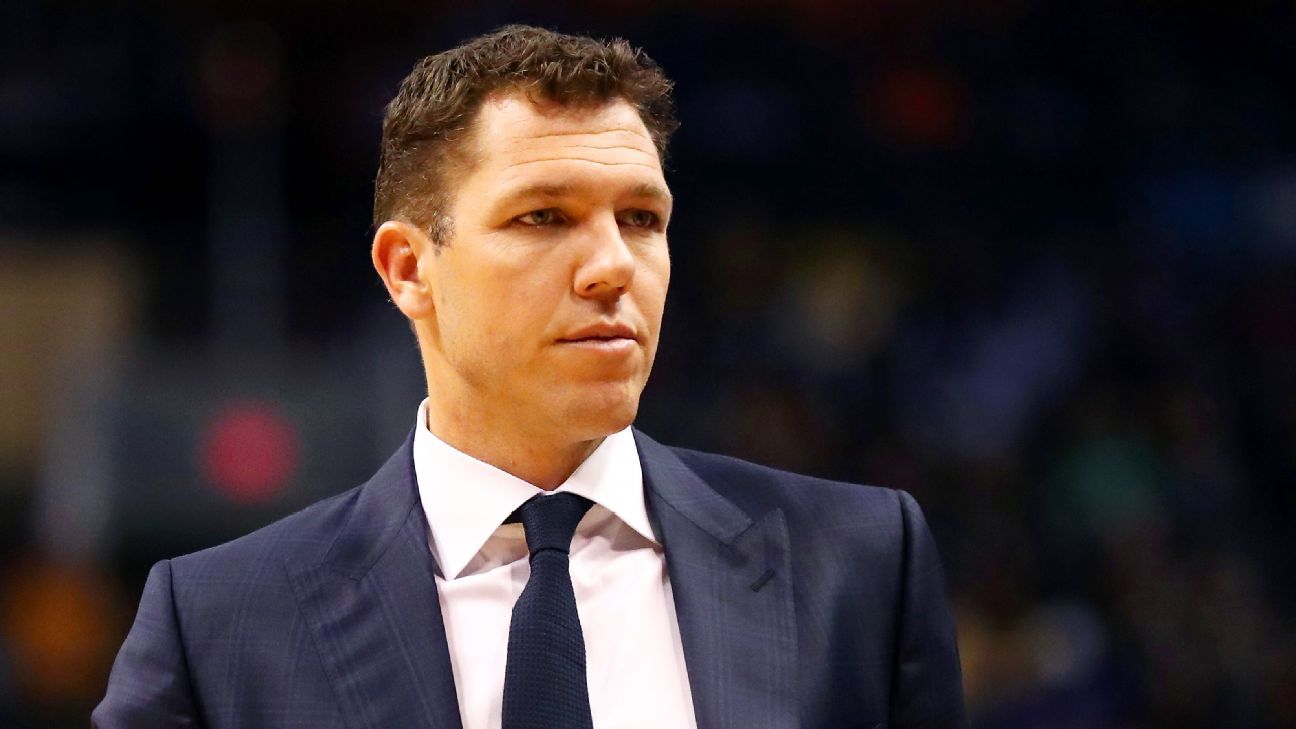BEFORE LUKE WALTON could finish the brisk, three-minute walk from the team hotel to StellaNova café for his morning coffee on a lazy Tuesday in Oklahoma City, the Los Angeles Lakers coach was spotted by a couple on the street.
It was the Lakers’ final road trip of their season. And this couple had flown in from Australia to see the Lakers face the Thunder.
Walton, hardly incognito with a Lakers cap covering his wavy hair and a sweat suit on his 6-foot-8 frame, stopped to pose for a photo before ducking into the shop for his caffeine fix: medium, black.
“They didn’t think they were seeing Alex Caruso and Johnathan Williams when they bought those plane tickets,” Walton said with a laugh.
Rather than fighting for playoff seeding in the final games, L.A. was officially eliminated from postseason contention with 10 games left on the schedule. Six straight years with no playoff basketball for the once-proud franchise.
LeBron James was shut down with six games remaining; Brandon Ingram missed the final 19 games; Lonzo Ball missed the final 35 games; Josh Hart missed the final 11. Kyle Kuzma and Tyson Chandler also played sparingly because of injuries.
“It’s easy to work hard when things are going well, but to show up and continue to work hard when times are tough, that’s what this group has done,” Walton said as the season wound down. “And it makes it enjoyable to coach.”
That enjoyment will have to come elsewhere now.
The Lakers announced Friday afternoon that the team and Walton had “mutually agreed to part ways.” But make no mistake, no matter what the media release said: Walton was fired.
Despite whatever challenges existed, Walton wanted to remain the coach of the Lakers, sources said.
WALTON HAD A sense that the Lakers’ final road trip of the season could also end up being his final road trip as the head coach, sources close to him said. He spent some time before L.A.’s season finale hugging staffers and chatting with his parents, presumably there to see their son’s final game and sendoff.
But he had no clue that his final days would play out in such a dramatic manner.
Moments after Walton’s pregame availability, after he left the dais outside the Lakers’ locker room and returned to the coaches room, Magic Johnson stood in to take his place.
“Make sure that door is closed,” Johnson said, referring to the locker room entrance, before shocking the basketball world by resigning as the president of basketball operations.
He cited all sorts of reasons for his decision in an impromptu 45-minute news conference (which was followed by separate 10-minute and 15-minute breakout sessions, as if he hadn’t already said enough). Included on that list was his desire to avoid conflict with Lakers owner Jeanie Buss — whom he didn’t inform of his decision to step down in advance — because of their differing opinion on Walton. Johnson wanted to fire him; Buss supported her young coach.
“Tomorrow, I would have to affect someone’s livelihood and life,” Johnson said of his plans to dismiss Walton as soon as the season ended. “I thought about that and said, ‘That’s not fun for me. That’s not who I am.’ Then I don’t want to put her in the middle of us. Even though, she said, ‘Hey, you do what you want to do.’ I know she has great love for him and great love for me.”
Walton learned that Johnson was resigning via text while preparing for the Trail Blazers game with his staff, sources said.
Even with Johnson out of the picture, Walton’s fate was sealed.
There wasn’t much to love in Laker Land in 2018-19. All the excitement generated from LeBron James’ decision to come to L.A. was sapped almost instantaneously once the games began. A series of missteps leaves L.A. searching for answers heading into the offseason.
Walton went 98-148 (.398) in three seasons on the sidelines, overseeing a regime change from former vice president of basketball operations Jim Buss and former general manager Mitch Kupchak to Johnson and Rob Pelinka, and expectations that went into warp speed upon James’ arrival.
Following one of the most frustrating and disappointing seasons in franchise history, L.A. enters into an offseason already rife with upheaval. With no coach, no top basketball decision-maker and no guarantee that any marquee free agent will accept the max contract they carved out of their cap space to use this summer, the franchise’s momentum has sputtered — if not halted completely.
ALMOST IMMEDIATELY AFTER James signed a four-year, $153.3 million deal with the Lakers, Walton’s job security became a hot-button topic. Coaches have famously had their difficulties in the initial season after signing James as a free agent (see Erik Spoelstra and David Blatt).
Coaching in the NBA is difficult under ideal conditions. When there are more factors working against you other than, you know, the opposing teams full of the best basketball players in the world, it can seem impossible.
“I’m maybe his biggest fan,” Golden State Warriors coach Steve Kerr told ESPN late in the season. “I just know how perfect he is for the job of being an NBA coach. But given my experience, I’m also well aware that every single one of us, even Gregg Popovich, is dependent upon circumstances — i.e. management, ownership, talent, expectations. All those things factor in.”
While Johnson and Pelinka felt the roster they had constructed was capable of making noise in the playoffs, others around the league felt Walton had been handed a ticking time bomb. One Hall of Fame executive described the group as “a volatile mix of people, there’s no doubt about it.”
“If I didn’t know any better, I’d have thought that they were setting Luke up to fail [with that roster],” one NBA assistant coach said.
Walton certainly knew what he was facing. James said all the right things and asked the media for patience whenever asked about Walton early in the season. The star, whose mantra is “the best teacher in life is experience,” was acutely aware of his previous challenges in his first season in Miami with Spoelstra and in his first year returning to Cleveland with Blatt.
James’ biggest adjustment for Year 1 in L.A. was always going to be staking his claim in the competitive Western Conference. His relationship with his coach was important, of course, but sources close to James say he mostly manages his season — the physical and mental game-to-game preparation — on his own as a 16-year veteran.The coach’s job, sources said, was to find ways to challenge and motivate James when he strayed from the group.
To this end, Walton’s methods can be questioned — Walton never challenged James publicly all season. While James’ statistical production was beyond reproach, his attitude wasn’t. Look no further than the Lakers’ players-only meeting in Memphis, which took aim at James’ poor body language, as first reported by ESPN last month.
Walton took a different approach, empowering James publicly while allowing him space privately, sources said. It was a tactic Walton observed when Phil Jackson coached Kobe Bryant in L.A. the second time around. He reached out to James’ former coaches, Ty Lue and Spoelstra, for advice, too, and went into the season looking to win over James and Rajon Rondo in the hopes that the rest of the locker room would follow their leadership.
“I told [Walton] the same thing I’ll tell everybody else,” Spoelstra said before the Lakers played the Miami Heat in November. “He’s the perfect guy to coach that team. He has purple and gold bleeding from him. He is a Laker. He did a tremendous job with Golden State when he had to take over for Steve [Kerr].
“And if you look at his whole professional career, all [Walton] has been involved with are teams like this — with great expectations, with a lot of pressure and a lot of noise,” Spoelstra continued. “He doesn’t know any different. I don’t think you can find a better fit to coach that team.”
Spoelstra, though, had the backing of longtime boss Pat Riley, and the decades-long foundation of a functional franchise. Walton, who was hired by Jim Buss and Kupchak, had no such luxuries.
The implicit pressure that came with coaching the team became far more direct after L.A. limped out of the gate 2-5. Johnson dressed down Walton in an explosive meeting, demanding immediate results. Everyone in the Lakers organization began feeling the pressure of trying to win now despite the fact that Johnson had asked the fan base to remain patient.
In the aftermath, Johnson told the Los Angeles Times and ESPN that Walton was safe and would coach the remainder of the season — offering no vote of confidence beyond that.
Beyond the early-season meeting, communication between Walton and the front office was fraught, sources told ESPN. At one point, Pelinka sat in on coaches’ meetings, involving himself at a granular level in Walton’s workload. In another example, Walton went weeks without hearing a peep from Magic Johnson. Both tactics were unusual for an NBA team.
As damning as Walton’s early-season meeting with Magic might have been, the true death knell came when he was left out of LeBron’s exit meeting with Johnson and Pelinka, conducted several days before the end of the season, according to a report by ESPN’s Ramona Shelburne.
What kind of future could he have with LeBron if he wasn’t important enough to discuss their past season together?
ON THE COURT, the Lakers struggled to consistently play like a cohesive group. They were at times frustrated with Walton’s rotations and substitution patterns.
Another critique of Walton echoed throughout the season by multiple opposing scouts and players to ESPN was that his team did not run complex sets. Walton told reporters that he tried several offensive packages throughout the season, but never drilled down as much as he would have liked because of the constant roster turnover and injuries. “A lot of the idea behind the game planning is, ‘Let’s keep it simple,’ so that players aren’t overthinking things,” Walton said. “Let’s keep it simple so we can play really hard.”
On the other side, Rondo steadfastly supported Walton throughout the season, saying Walton was one of the best coaches he has played for.
“That’s my guy,” Rondo told ESPN. “We’ve had an open dialogue from Day 1 and it’s very refreshing. Even [Alvin] Gentry last year was pretty much similar as far as coaches doing what they say and saying what they mean. So, he’s told me from Day 1 he wants to keep an open dialogue, communication, always on the same page.”
And then came the Anthony Davis debacle.
In the weeks leading up to the Feb. 7 trade deadline, Walton said he tried to tell his young players, all of whom had heard their names mentioned in one reported deal or another, to block out the noise.
And when the trade for Anthony Davis didn’t go down, the stench only lingered.
When the Lakers arrived in Philadelphia after the trade deadline, Johnson came into the locker room about 30 minutes before tipoff — the time usually reserved for the coaching staff to go over the game plan — and had an announcement for the team.
Johnson reasoned to the players that the fact they weren’t traded means the Lakers wanted them more than any other team did and then tried to rally them together, declaring his goal of making the playoffs.
The message fell flat, sources told ESPN.
“It was bad,” one source said. “It was bad.” Another source was sketchy on Johnson’s exact message because, well, he “tuned the m—–f—– out.”
Later in the season, it was the coach’s turn to struggle making headway with what he was trying to convey. Walton sat next to Jeanie Buss on a plane ride back at the conclusion of a five-game road trip in late March. His ousting seemed like an inevitability by that point. But rather than use the time with his boss to complain, Walton told Buss that he believed the coaching staff and front office could all grow together if given the chance, sources said.
Buss offered Walton an endorsement on a podcast appearance with the “Sports Business Radio Road Show” two weeks later, saying, “I think he’s done a terrific job.” But she passed the buck to her team president when it came to Walton’s future. “In terms of basketball decisions, I will always defer to Magic,” she said.
Magic, it turned out, deferred to Pelinka … by default. It was the GM who issued the statement Friday thanking Walton for his service on his way to the unemployment line.
Just months earlier, Pelinka was mostly cut out of trade talks between L.A. and New Orleans, with the Pelicans preferring to deal directly with Johnson, multiple league sources told ESPN.
Now here Pelinka was speaking on behalf of the franchise with Johnson and Walton gone — and Davis still in New Orleans.
HIRED BY THE previous regime to oversee a steady rebuild of the iconic franchise, Walton was supposed to help bring the winning culture of the Warriors while developing young prospects like Ball, Ingram and Kuzma.
But for all the issues pressed upon the coaching staff, the Lakers could never quite stop their playoffs hopes from bleeding out with inexplicable losses to tanking teams like the Knicks (twice), Cavaliers, Suns, Hawks, Pelicans and Grizzlies.
“Those losses hurt pretty [bad] — I mean you don’t feel great about ’em,” Walton said. “… Those are some of the ones that I would — if taking time to look back at the losses this season — those would be some of the more painful ones.”
Now Walton leaves the franchise he loves, the one he won two championships with as a player and the one that gave him his first head coaching opportunity. But there should be other opportunities for the 39-year-old. The Sacramento Kings have already shown interest, sources said.
“He’s got the right temperament,” Kerr told ESPN. “He’s got the right combination of competitiveness, but laid-back nature. He’s fun to be around. He’s smart as hell. He’s got a great sense of humor. He’s the same guy whether you win five in a row or lose five in a row.
“And in this environment, these days especially, coaching in the NBA, with all of the judgment and criticism? My god. Do you know how hard it is to find that person? Good luck.”


